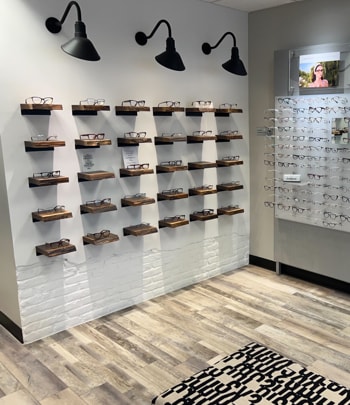
Preserving Your Health & Vision
Eye care is more than vision care, although they are connected. Your eyes can show symptoms of major health problems, such as autoimmune diseases, heart disease, or diabetes.
The earlier an eye or health problem is detected, the greater chance you can receive appropriate treatment. Our optometrists can also help you manage chronic eye problems, from digital eye strain to dry eyes.
Keep an eye on your health with regular eye exams and everyday eye care. Talk to our optometrists about eye care tips to preserve lifelong, healthy vision!


Preventative Eye Care
Optometrists are knowledgeable about many eye problems, and we want to help keep our patients informed about how they can protect their eyes. From eye nutrition tips to eye hygiene, our optometrists can offer personalized advice about your eye care.
When you have eye questions, we’re here to talk. Even if you receive a clean bill of health, we welcome curiosity. We’re passionate about eye care and would love to share preventative eye care tips or advice about managing your vision concerns. Chat with your optometrist at your next appointment to learn more.

Common Eye Diseases & Conditions
We can diagnose and help manage many common eye diseases and conditions, including age-related macular degeneration, cataracts, conjunctivitis, and glaucoma.
Age-Related Macular Degeneration
Age-related macular degeneration (AMD) is an eye disease affecting the macula—tissue essential for central (straight-ahead) vision and color. It’s the leading cause of severe vision loss in adults over 50. Poor nutrition and UV exposure can also affect macular health.
There are 2 types of AMD:
- Dry AMD (the most common form) causes the macula to slowly thin, deteriorating over time. Small, yellow deposits (drusen) under the retina can signify dry AMD.
- Wet AMD (the rarer form) develops when abnormal blood vessels grow under the retina. The blood vessels leak fluid, causing the macula to swell and thicken. Wet AMD can cause severe or sudden symptoms, including blindness.
Early symptoms of dry AMD often go unnoticed. However, as the disease progresses, it can decrease your color vision and visual sharpness, leading to a dark or empty spot in your central vision. Straight lines may also appear wavy.
There is no cure for dry AMD, but you can reduce your risk with diet and nutrition. Eye doctors can help manage wet AMD with injections or surgery.
Cataracts
Cataracts are cloudy or hazy spots that form in the eye’s clear lens. These spots decrease vision by blocking light, like a spot on a car windshield or a fingerprint on glasses. Cataracts are a leading cause of low vision and blindness in the US.
Aging is the most common cause of cataracts. Those with diabetes and other health conditions or who take certain medications have an increased risk of developing cataracts. Cataracts can also form due to excessive UV exposure.
Vision problems caused by early-stage cataracts can be corrected with glasses or contact lenses. When cataracts thicken or significantly reduce vision, surgery may be an option. The natural lens is removed and replaced with a clear artificial lens.
Conjunctivitis (Pink Eye)
Conjunctivitis is the clinical term for pink eye (or red eye). When the conjunctiva (transparent tissue covering the eyes and inner eyelids) is inflamed, the eye can appear bloodshot or pinkish. There are 3 types of conjunctivitis: allergic, chemical, and infectious (bacterial or viral). Infectious conjunctivitis is highly contagious.
The appropriate treatment depends on the type and cause. For example, allergic conjunctivitis is caused by allergies, so it’s treated with antihistamines or by moving away from the allergen. Optometrists can treat pink eye caused by a bacterial infection with antibacterial ointment or eye drops.
See your optometrist for pink eye, as severe inflammation or infection can cause long-term eye problems.
Glaucoma
Glaucoma is an eye disease causing optic nerve damage. The optic nerve sends visual information from the eye to the brain. When this bundle of nerves deteriorates, it can cause vision loss and blindness.
There are multiple forms of glaucoma, but for all, early detection is crucial for protecting your sight. The most common develop slowly with few early symptoms. But optometrists can detect glaucoma by measuring intraocular pressure (IOP). When fluid builds inside the eye, it presses on the optic nerve.
At Gresham Optical, we measure changes in eye pressure with the iCare tonometer. The handheld device gently taps the cornea (the front of the eye), quickly evaluating eye pressure without the need for numbing eye drops or eye-drying air puffs.

See Us for Eye Tips
Every day matters when it comes to your eyes. Prevention and detection are essential to preserving your eye health. Our optometrists offer personalized eye care tips to protect your vision and control risk factors. Come see us at Gresham Optical to discuss your eye health!

Featured Services

Comprehensive Eye Exams
Your eye exam should be completely yours—tailored to your eyes and health needs. Enjoy thorough eye exams personalized for you and performed by our qualified optometrists.

Digital Eye Strain Mediation
Long hours in front of your computer or on your phone can put a strain on your eyes. Learn more about how our team can help mitigate the uncomfortable symptoms of digital eye strain.

Dry Eye Evaluations & Solutions
Red, irritated eyes can cause undue stress during your day. Our effective solutions help you see comfortably and clearly all day long. Discover how we can help with our dry eye therapies.

Contact Lens Exams, Fittings, & Brands
Enjoy the ease and clarity of contact lenses. Our contact lens exams assess the health of your eyes and the suitability of your contact lenses. Find out how you can enjoy frame-free vision.


View Our Selection
Of Brands










Come See Us in Gresham
Our doctors and staff are ready to welcome you to Gresham Optical. Our location is across from the Gresham Golf Course. Look for the red brick building on the corner of Northeast Division Street and Northeast Francis Avenue. There’s plenty of parking available, with a lot in front of the building.

Get in Touch!
Our practice is located inside the medical building across from the Gresham Golf Course, just off Northeast Division Street.
- 503-667-2424
- 503-492-3236
- [email protected]
- 2150 NE Division Street
- Gresham, OR, 97030
Hours Of Operation
- Monday: 9:00 AM – 6:00 PM
- Tuesday: 9:00 AM – 6:00 PM
- Wednesday: 9:00 AM – 6:00 PM
- Thursday: 9:00 AM – 6:00 PM
- Friday: 9:00 AM – 6:00 PM
- Saturday: 9:00 AM – 1:00 PM
- Sunday: Closed



